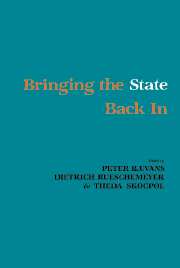Book contents
- Frontmatter
- Contents
- Preface
- Introduction
- Part I States as Promoters of Economic Development and Social Redistribution
- Part II States and Transnational Relations
- Part III States and the Patterning of Social Conflicts
- 8 Working-Class Formation and the State: Nineteenth-Century England in American Perspective
- 9 Hegemony and Religious Conflict: British Imperial Control and Political Cleavages in Yorubaland
- 10 State Power and the Strength of Civil Society in the Southern Cone of Latin America
- Conclusion
- Notes on the Contributors
- Index
9 - Hegemony and Religious Conflict: British Imperial Control and Political Cleavages in Yorubaland
Published online by Cambridge University Press: 29 January 2010
- Frontmatter
- Contents
- Preface
- Introduction
- Part I States as Promoters of Economic Development and Social Redistribution
- Part II States and Transnational Relations
- Part III States and the Patterning of Social Conflicts
- 8 Working-Class Formation and the State: Nineteenth-Century England in American Perspective
- 9 Hegemony and Religious Conflict: British Imperial Control and Political Cleavages in Yorubaland
- 10 State Power and the Strength of Civil Society in the Southern Cone of Latin America
- Conclusion
- Notes on the Contributors
- Index
Summary
There is a hierarchy of cleavage bases in each system and these orders of political primacy not only vary among polities, but also tend to undergo changes over time. Such differences and changes in the political weight of sociocultural cleavages set fundamental problems for comparative research: When is region, language, or ethnicity most likely to prove polarizing? When will class take the primacy and when will denominational commitments and religious identities prove equally important cleavage bases? … what we want to know is when the one type of cleavage will prove more salient than the other, what kind of alliances they have produced and what consequences these constellations of forces have had for consensus-building within the nation-state.
A Puzzle
The Yoruba, a nationality comprising some 10 million people who dominate the political scene in the five states of southwestern Nigeria, have experienced three generations of religious differentiation. Since the late 1890s, when nearly everyone shared a common allegiance to a religious framework, about 40 percent of the Yorubas have converted to Christianity and about the same percentage have become Muslims. In a previous publication, I reported that, in the past century, two religious subcultures have indeed emerged. Christian Yorubas conceptualize authority relations, responsibility, and the meaning of participation differently from Muslim Yorubas, but when it comes to issues on the political agenda of the day, the two subcultures hold virtually identical views.
- Type
- Chapter
- Information
- Bringing the State Back In , pp. 285 - 316Publisher: Cambridge University PressPrint publication year: 1985
- 23
- Cited by



